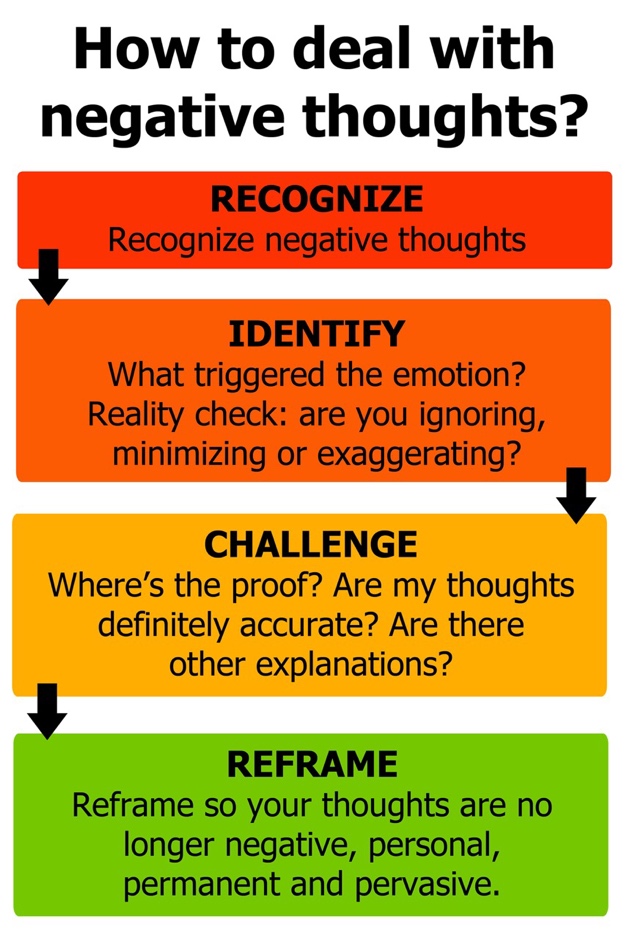Managing stress and emotions is crucial for maintaining overall well-being. Stress and emotions are interconnected and influence our mental and physical health. Understanding this connection and implementing effective strategies can help manage stress and emotions effectively.
The Connection Between Emotions and Thoughts

Our emotions are intricately linked to our thoughts. Negative thought patterns can lead to distorted perceptions of reality, intensifying emotional responses. It’s important to question and challenge these thoughts to regain control. With an estimated 60,000 thoughts per day, many of which are repetitive and subconscious, writing down these negative thoughts can help in reframing them. Reframing thoughts is about changing how you perceive and interpret negative or challenging situations. It’s about finding a different, more positive or constructive way to view these situations.

Keep a journal to track repetitive negative thoughts. This practice can help you identify patterns and reframe your mindset, which promotes a healthier thought process. The process of identifying and reframing these thoughts can bring a sense of accomplishment, motivating you to continue this journey towards a healthier mindset.
The Impact of Stress on Emotions

Life experiences, culture, and belief systems shape our worldview, which influences our emotional and psychological responses to stress. Negative self-talk can lead to negative emotions, affecting the body’s regulatory systems such as:
- Hypothalamus
- The hypothalamus is a small region in the brain that controls many bodily functions, such as temperature, hunger, thirst, and sleep, by releasing hormones and regulating the autonomic nervous system.
- The hypothalamus is a small region in the brain that controls many bodily functions, such as temperature, hunger, thirst, and sleep, by releasing hormones and regulating the autonomic nervous system.
- Autonomic Nervous System (ANS)
- The autonomic nervous system controls involuntary body functions like heart rate, digestion, and respiratory rate, and it has two main parts:
- Sympathetic Nervous System
- Prepares the body for stress or emergency situations (fight or flight response).
- Prepares the body for stress or emergency situations (fight or flight response).
- Parasympathetic Nervous System
- Promotes relaxation and recovery (rest and digest response).
- Promotes relaxation and recovery (rest and digest response).
- Sympathetic Nervous System
- The autonomic nervous system controls involuntary body functions like heart rate, digestion, and respiratory rate, and it has two main parts:
This interaction can lead to psychological stress, which, if left unmanaged, can result in chronic diseases.
These systems work together to maintain balance and respond to changing needs in the body.
Understanding the Brain’s Role
Research shows that negative emotions trigger specific brain activity patterns, leading to stress responses. This reaction can cause long-term distress and health issues.
Tips to Manage Stress and Emotions

Question Your Thought Patterns
Challenge the accuracy of your thoughts.
Reframe negative thoughts by questioning their validity.

Practice Deep Breathing

Try the 4-4 breathing technique: breathe in for four counts and out for four counts for five minutes.
This practice can help slow your heart rate and calm your mind.
Engage in Physical Activity

Take a walk or do 15 minutes of yoga.
Physical exercise can boost your mood and reduce stress.
Aromatherapy

Use essential oils to activate brain receptors and ease anxiety.
Scents like lavender, chamomile, and bergamot are known for their calming effects.
Mindfulness and Meditation

Practice mindfulness to stay present and reduce anxiety.
Meditation can help clear your mind and promote emotional balance.
Connect With Others

Talk to friends or family members about your feelings.
Social support is crucial for managing stress and emotions. Talking to friends or family members about your feelings can provide a sense of connection and support, making the journey towards better mental and emotional health less daunting.
Healthy Lifestyle Choices

Maintain a balanced diet, get enough sleep, and avoid excessive caffeine and alcohol.
A healthy body supports a healthy mind.
Seek Professional Help
If stress and emotions become overwhelming, consider seeking help from a health and wellness coach or mental health professional. They can provide you with the tools and strategies to manage stress effectively.
Benefits of Managing Stress and Emotions
Effectively managing stress and emotions can lead to numerous benefits that positively impact your mental and physical health. Here are some key benefits:
Improved Mental Health
- Reduced Anxiety and Depression
- By managing stress, you can reduce symptoms of anxiety and depression, leading to a more positive outlook on life.
- By managing stress, you can reduce symptoms of anxiety and depression, leading to a more positive outlook on life.
- Enhanced Emotional Stability
- Effective stress management helps maintain emotional balance, reducing mood swings and emotional outbursts.
- Effective stress management helps maintain emotional balance, reducing mood swings and emotional outbursts.
- Better Cognitive Function
- Stress management techniques improve concentration, memory, and decision-making abilities.
- Stress management techniques improve concentration, memory, and decision-making abilities.
Physical Health Benefits
- Lower Blood Pressure
- Reducing stress can help lower blood pressure, reducing the risk of heart disease and stroke.
- Reducing stress can help lower blood pressure, reducing the risk of heart disease and stroke.
- Strengthened Immune System
- Chronic stress weakens the immune system. Managing stress can enhance immune function, making you less susceptible to illnesses.
- Chronic stress weakens the immune system. Managing stress can enhance immune function, making you less susceptible to illnesses.
- Better Sleep
- Stress management techniques can improve sleep quality, helping you feel more rested and rejuvenated.
- Stress management techniques can improve sleep quality, helping you feel more rested and rejuvenated.
Enhanced Quality of Life
- Increased Productivity
- Reduced stress and better emotional control can help you focus and be more productive in your personal and professional life.
- Reduced stress and better emotional control can help you focus and be more productive in your personal and professional life.
- Improved Relationships
- Managing stress and emotions can lead to healthier relationships with family, friends, and colleagues. It promotes better communication and understanding.
- Managing stress and emotions can lead to healthier relationships with family, friends, and colleagues. It promotes better communication and understanding.
- Greater Life Satisfaction
Managing stress and emotions is essential for maintaining overall health. Understanding the connection between thoughts, emotions, and stress and implementing practical strategies can improve your mental and physical well-being. It’s about taking small, consistent steps towards a healthier, balanced life.








